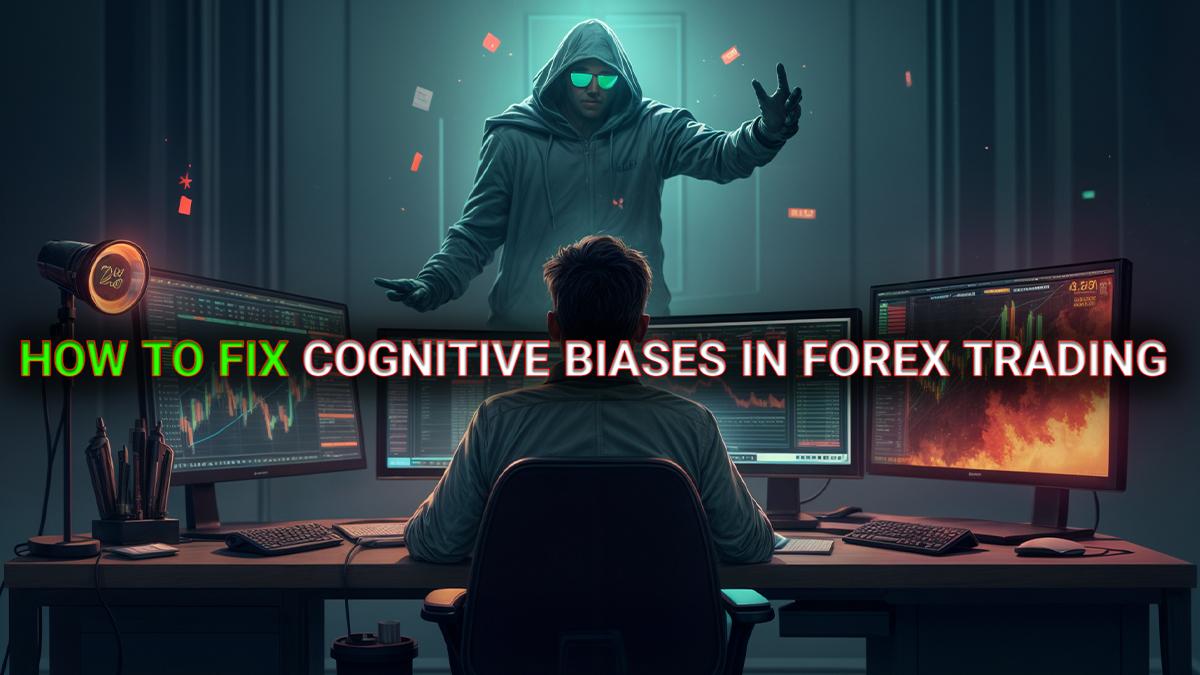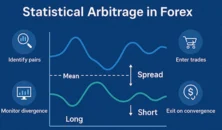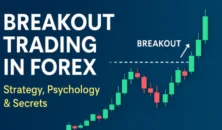🧠 What You’ll Discover in This Article (Cognitive biases in forex trading) :
- 🔍 The definition and real impact of cognitive biases in trading
- 🧠 Detailed breakdown of key biases: Overconfidence, Loss Aversion, Confirmation Bias, and more
- 🛠️ Actionable techniques to recognize and overcome trading biases
- 💡 Practical mindset shifts to improve emotional discipline
- 📘 FAQs on trading psychology for deeper understanding
Common Cognitive Biases in Forex Trading and How to Overcome Them
Cognitive biases can be a trader’s worst enemy, leading to irrational decisions and costly mistakes. In the fast-paced world of forex trading, understanding these biases and learning how to counteract them is crucial for long-term success. Below, we’ll explore the most common cognitive biases in trading and practical strategies to overcome them.
List of Cognitive Biases in Forex Trading , Examples and Solutions:
1. Confirmation Bias
Traders tend to seek information that confirms their existing beliefs while ignoring conflicting data. This can lead to overconfidence in trade setups and poor risk management.
Example in trading: You buy EUR/USD, and then you ignore negative news, only searching for sources that confirm your bullish outlook.
How to Fix Confirmation Bias:
- Always analyze market data from multiple sources, including both technical and fundamental analysis.
- Regularly challenge your own assumptions by considering opposing views.
- Keep a trading journal to track decision-making patterns and learn from past mistakes.
2. Loss Aversion
According to behavioral finance theories, traders feel the pain of losses much more intensely than the pleasure of equivalent gains. This often results in holding onto losing trades for too long in the hope that they will recover.
Example in trading: You hold a losing trade for too long, hoping it will reverse, and exit winners too early.
How to Fix Loss Aversion Bias :
- Set clear stop-loss levels before entering a trade and stick to them.
- Focus on risk-to-reward ratios, ensuring that potential profits outweigh potential losses.
- Reframe losses as a learning experience rather than a failure.
3. Illusion of Control
Many traders believe they have more control over the market than they actually do. This can lead to excessive trading, overleveraging, and unrealistic expectations.
Example: After tweaking your strategy for weeks, you believe you’ve “mastered” the market. You start overtrading with big positions, thinking you can time every move. The market proves you wrong.
How to Fix It:
- Acknowledge that forex markets are influenced by unpredictable factors beyond personal control.
- Use backtesting to validate strategies instead of relying on gut feelings.
- Focus on risk management and proper trade execution rather than attempting to predict market movements perfectly.
4. Hindsight Bias
After a major market move, traders often believe they saw it coming all along. This bias can lead to overconfidence and an underestimation of market uncertainty.
Example: After a big drop in AUD/USD, you say, “I knew this was going to happen!” But you didn’t take the trade — your trading journal shows no plan or entry for that move.
How to Overcome It:
- Keep a detailed record of trade rationales before execution and compare them to the actual outcomes.
- Recognize that past events may seem obvious in retrospect, but predicting them beforehand is much more challenging.
- Avoid making trading decisions based solely on past patterns without considering current market conditions.
5. Overconfidence Bias
A few consecutive winning trades can create a false sense of skill, leading traders to take excessive risks and neglect proper risk management.
Example: After three successful trades, you double your lot size on the fourth without proper analysis. The trade goes against you and wipes out your previous gains.
How to Overcome It:
- Base position sizing on a predefined risk management plan rather than recent success.
- Take breaks between trades to reassess market conditions objectively.
- Regularly review trading performance to identify areas for improvement.
6. Herding Behavior
Many traders follow the crowd, buying when the market is euphoric and selling in panic, often resulting in poor timing and significant losses.
Example: You see everyone on Twitter excited about buying gold (XAU/USD). You join in — without any analysis — just before a sharp reversal hits.
How to Overcome It:
- Develop an independent trading strategy based on thorough analysis rather than market hype.
- Be cautious of entering trades based solely on trending sentiment without verifying fundamental or technical signals.
- Use contrarian strategies to capitalize on market overreactions.
7. Survivorship Bias
Traders tend to focus on success stories while ignoring the vast number of failed traders who exited the market.
Example: You follow a trader on Instagram who claims massive profits, thinking trading is easy. You ignore the thousands of others who blew their accounts and disappeared.
How to Overcome It:
- Study both successful and unsuccessful trading stories to gain a more realistic view of forex trading.
- Analyze statistics on trader success rates rather than assuming profitability based on visible success stories.
- Set realistic expectations and understand that consistent profitability requires discipline, strategy, and experience.
8. Anchoring Bias
This occurs when traders become fixated on a specific price level, such as an entry price, and fail to adapt to changing market conditions.
Example: You bought USD/CHF at 0.9000. Even though the chart turns bearish, you hold on because you’re “anchored” to your entry and hope it returns to that level.
How to Overcome It:
- Focus on real-time data and price action rather than past entry points.
- Use objective indicators like moving averages and trendlines to confirm trading decisions.
- Be flexible and willing to adjust your trading plan based on new market information.
Final Thoughts
Cognitive biases in forex trading are an unavoidable part of human decision-making, but recognizing and mitigating their effects can significantly improve trading performance. By maintaining a disciplined approach, continuously educating yourself, and implementing strong risk management strategies, you can navigate the forex market more effectively and make more rational decisions.
❓ Frequently Asked Questions About Cognitive biases in forex trading (FAQs)
It’s a mental shortcut or distortion that affects how traders interpret market data—leading to irrational decisions like holding a losing position too long or chasing quick profits.
Bias in forex trading refers to traders’ tendency to make decisions based on emotion, habit, or flawed thinking rather than facts—such as expecting a currency to rise just because it did yesterday.
Loss aversion is a great example—traders feel the pain of a $100 loss more intensely than the joy of a $100 gain, which often leads to poor risk-reward decisions.
Confirmation bias—when a trader only looks for news or charts that support their current position and ignores opposing signals.
Use a trading journal, set rule-based strategies, automate entries/exits, and review your emotional triggers regularly.
It’s the belief that prices will go up—often formed by habit, past trends, or hope. While it can help with strategy, it also blinds traders to reversal signals.
Stick to a trading plan, limit screen time, meditate or journal before trading, and don’t risk more than you’re emotionally comfortable losing.
Overconfidence bias—traders think they’re smarter than the market after a few wins, then make risky bets that often backfire.
Calm, analytical, disciplined. The best traders treat the market like a math problem, not a casino.
Track your trades and emotions. If you see repeating patterns of impulsive decisions or missed signals, bias is likely at play.
Overconfidence, confirmation bias, and loss aversion. Together, they create most of the psychological traps traders fall into.
Anchoring bias—relying too heavily on the first piece of information you see (like a past price level) even when the market has changed.
Related Book : Trading by Professional Traders: An Experiment








